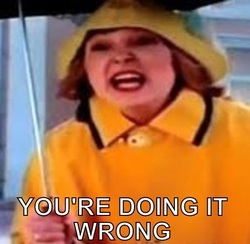
So why is there is a disconnect between what PPC can actually do and what business owners perceive that it can do? It’s probably it’s one of two things – either a general lack of understanding about PPC or reaction to a negative experience with PPC. Unlike large corporations, SMBs don’t have money to play with, so lot of times if they try something and it doesn’t work quickly they scrap the project and never look back. I would be willing to bet that there are business owners who tried PPC on their own and didn’t see a return right away so they have sworn off of PPC moving forward. The problem with that is that it doesn’t really give PPC a chance. I mean, if I tried to be my own dentist I probably wouldn’t have much faith in the science of dentistry, but when I have a toothache and need to go to the dentist for a procedure I absolutely believe that modern dentistry works!
Okay, you might not be old enough to recognize this image (it’s from Mr. Mom for anyone who was wondering), but it could very well be true. You could just be doing it wrong. And that’s okay! As a small business owner your area of expertise isn’t marketing, so you do the best you can with the resources that you have.
Well, we’re here to help. Below are 5 common mistakes that business owners and new advertisers make when running a PPC campaign:
1. Jumping in Without Doing Proper Research
When you’re starting something new it’s hard not to get carried away and just jump right in without doing your homework, but when it comes to PPC there are a few things you should figure out before you get started. This is a quick list of questions you should be able to answer before building out and launching a PPC campaign:
• How competitive is your industry when it comes to paid search (and by extension, how much should you plan to spend per click)?
• What are your competitors doing?
• What is your total monthly budget for the project?
• What is a conversion (sale, phone call, lead, person walking through your door, request for an estimate) worth to you?
• How will you measure success? What is your ultimate goal for this project?
2. Not Using Geo-Targeting
If you are advertising a local business your account settings should reflect that. Physical storefronts should advertise in their surrounding areas and local service providers should only advertise in the markets that they service. AdWords lets you customize your bidding in a variety of different ways to help you achieve the geo-targeting that best suits your business.
Now, it’s easy to see that a small local bakery doesn’t want to be advertising nationwide for donuts, but if you have a local business that also has an online store to sell your products that can be a little more confusing. In this case I would recommend taking a look at where you can be most profitable selling your products. In that same bakery scenario if the bakery also ships donuts overnight to people who purchase them online I would recommend just advertising within a radius of a few hundred miles to start. The reason for this is that even though you can ship donuts anywhere, I would argue that most people purchasing them are doing so because they have been to your bakery before and love your donuts but it’s just too far for them to drive to get your products and while these people could be anywhere in the world, the ones within a few hours from you are the ones that are going to be most likely to pay the shipping. (Someone across the country is probably going to have a similar lower priced item that they can buy closer to them.) Each business case is different, but in general I would advise starting small and then expanding later.
3. Bidding on Keywords that are Too General
The biggest mistake you can make when doing PPC is using keywords that are too general. Unless you have your geo-targeting set to only advertise in a very small area, you will want to use more specific keywords. For instance, if you are a gift shop you can get away with bidding on the keyword “gift shop” if your ads are only running 20 miles in each direction of your shop, but if you are advertising across your state or across the US you will need to use more specific terms like “gifts for college grads” or “cute country gifts” or “unique gifts for grandmas” or even “plush gifts for kids.”
4. Sending Traffic to the Homepage
Your homepage might be great, but it also may not be what someone is looking for when they search online. Pages that don’t get used nearly as often as they should include: category pages, specific product pages, the contact us page, testimonials page, pricing pages, and media appearances/buzz pages. Your choice of landing page should be based on the following elements:
• Keyword
• What your ad says
• Your overall goal for the campaign
5. Forgetting to Update Ads
Ads should be dynamic – reflecting your latest promos, current pricing, and the season. Don’t just create ads and then leave them running indefinitely (and if you’re thinking to yourself right now “but my ads never need to be changed because they’re always relevant” you should test some ads where you get more creative with your ad text because otherwise you may get stuck in a rut with your ads).
Want to continue the conversation? Contact us and we’ll answer your PPC questions!
Looking for a PPC management company? We would be honored to have your business! Get more information on how we can help your business succeed!
Kate Pierce is the owner of LionShark Digital Marketing LLC, a West Michigan internet marketing company. Her areas of expertise include Paid Search, Search Engine Optimization, Social Media, Web Consulting for small businesses, Copywriting and Local Online Marketing. She lives in the Grand Rapids area with her husband and enjoys cooking, watching sports and spending time outdoors. Like a true digital marketing expert (i.e. geek), she loves talking about marketing theory and SEM trends… so beware!

 RSS Feed
RSS Feed
